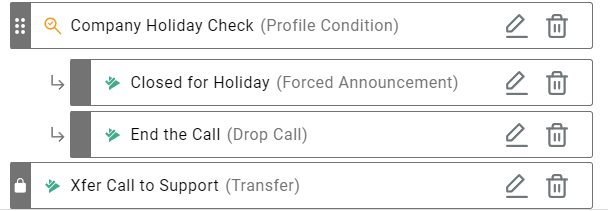Actions vs Conditions
What is an Action?
An IVR action is a step that either changes the call experience for the caller or modifies the call and it's accompanied data. In short, something was done. To better explain this, here are the available actions and a brief description of what process they offer:
- Collect Digits = Prompts the caller with a menu and awaits input from the caller
- Data Dip = Queries a company's internal or external database
- Drop Call = Terminates the call
- Forced Announcement = Plays an audio message to the caller
- Set Parameter = Transfer = Moves the caller from the current IVR to either another IVR, a skill group queue, direct to an agent, or to dialable number
What is a Terminating Action?
A terminating action is any step that will result in the caller leaving the current IVR. The existing actions that are also terminating actions are:
- Digit Menu
- Drop Call
- Transfer
Because these actions will result in the caller leaving the current IVR, they will be automatically placed at the bottom of their assigned flow (whether in an IVR or under a condition). The terminating action will include a "lock" symbol and does not allow you to drag and drop it higher in the flow.

Additionally, you'll only be able to add one terminating action to a flow. If you try adding a second, you will receive an error message and will be encouraged to remove the existing terminating action first.
What is a Condition?
An IVR condition can act as a trigger for a subsequent action. If a condition is met (true), the call flow can be altered when configured correctly.
To help you better understand, here are some example questions that may be relevant for changing a call flow's behavior:
Is this call coming in after business hours?
Is it currently a company holiday?
Do we recognize the caller's phone number as a member in our database?
Is the caller's account past due?
Conditions help check and answer for such needs. Here are the currently available conditions and an example of how they are utilized:
- Holiday Condition = Check a defined list of holidays to determine if the call came in on a day that your office is closed
- Time of Day Condition = Did the call come inside or outside of your company hours?
- Parameter Condition = Does any of the data about the caller suggest they should have a different experience?
What is a Sub-Action?
As suggested above, a condition by itself would not change the behavior of a call on it's own. You will need to add a sub-action to the condition to dictate the changed behavior when the condition is met.
As an example, let's say you've configured a Holiday condition and would like the caller to hear a friendly message informing them that the company is closed prior to dropping the call. You might add a sub-action or more underneath the Holiday condition like so:

Pro Tip: A drop call action allows you to add an optional announcement prior to dropping so you could do this same flow with just one sub-action
Note if the call came on a non-holiday, the call would move onto the next step which is to transfer the caller to Support.
Updated 4 months ago
